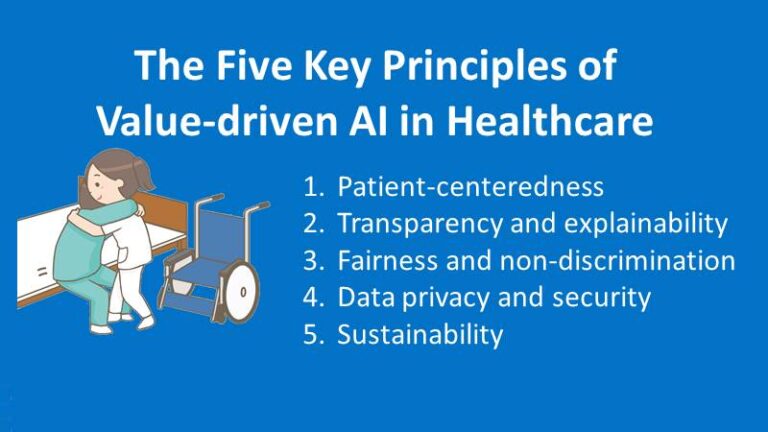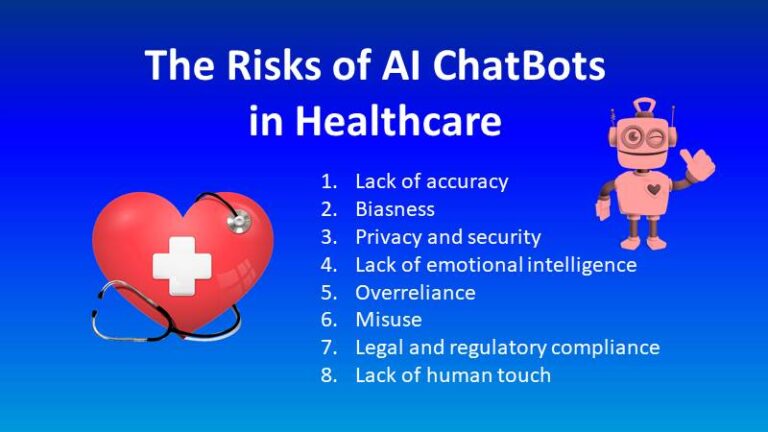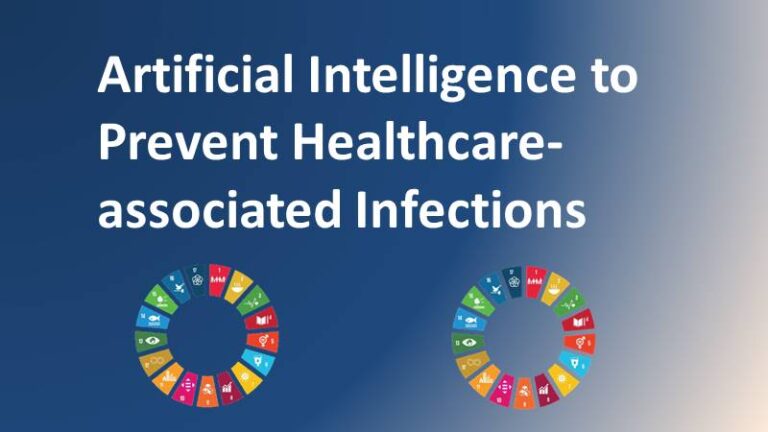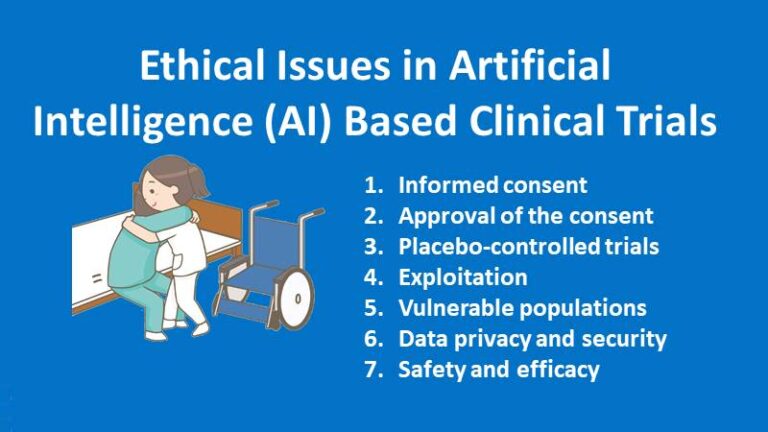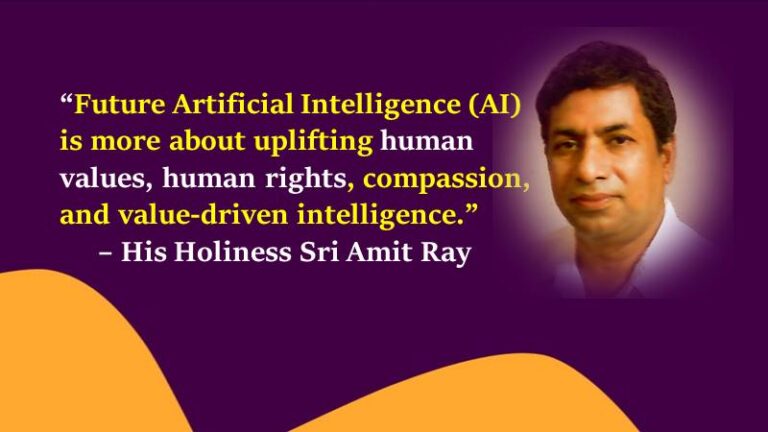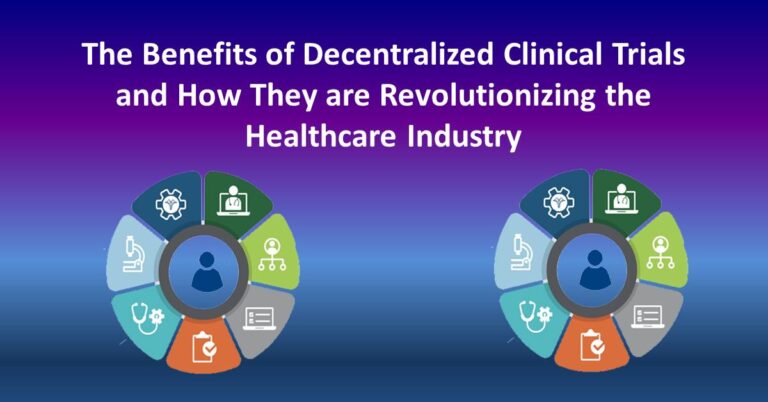Value Driven Healthcare Artificial Intelligence – The Nine Perspectives
“There is no glory in using artificial intelligence for military war. The glory of AI lies in using it to remove the sufferings of humanity.” – Sri Amit Ray, Pioneer of Compassionate AI.
In healthcare, artificial intelligence is increasingly focused on improving health, early and accurate diagnosis, and a better patient experience. Moreover, Artificial intelligence is becoming increasingly sophisticated at performing tasks that humans perform, but more efficiently, more quickly, and at a lower cost than humans.
The potential for value driven artificial intelligence in healthcare is enormous. For example, heart failure is a worldwide disease, that is becoming more common as the world’s aged populations. Despite the fact that the patient received standard treatment, the patient’s survival rate is poor. It is critical to identify patients at high risk of heart failure as soon as possible. AI has a huge role to play in identifying the heart failure risks at an early stage.
This transformation is currently underway in nine ways, Here, we discussed the nine perspectives of value driven artificial intelligence in healthcare.
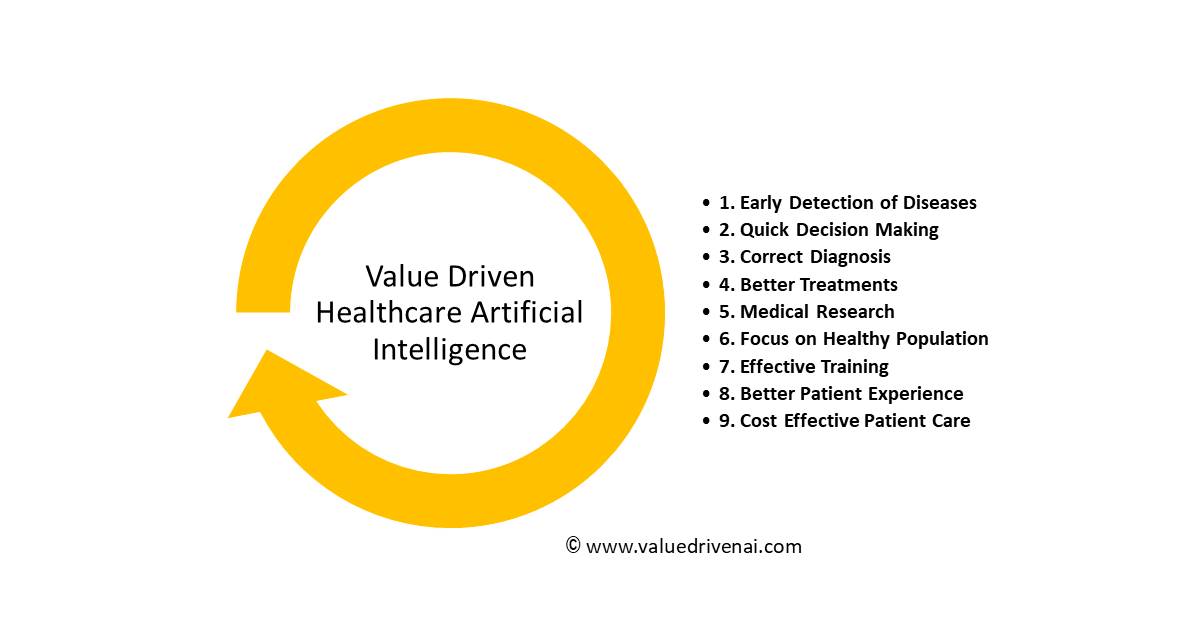
1. Early Detection of Diseases
Diseases such as cancer, for example, are already being detected more accurately and at an earlier stage thanks to artificial intelligence. According to the American Cancer Society, a high proportion of mammograms produce false positive results, resulting in one in every two healthy women being told that she has breast cancer (American Cancer Society). The use of artificial intelligence is making it possible to review and translate mammograms 30 times faster and with 99 percent accuracy, thereby reducing the need for unnecessary biopsies[1].
The proliferation of consumer wearables and other medical devices, combined with artificial intelligence, is also being used to monitor and detect early-stage heart disease, allowing doctors and other caregivers to better monitor and detect potentially life-threatening episodes at an earlier, more treatable stage, thereby saving lives.
2. Quick Decision Making
It is necessary to align big health data with appropriate and timely decisions in order to improve care. Predictive analytics can support clinical decision-making and actions, as well as prioritizing administrative tasks.
Another area where artificial intelligence is beginning to gain traction in healthcare is the use of pattern recognition to identify patients who are at risk of developing a condition – or who are seeing their condition deteriorate – as a result of their lifestyle, environmental, genomic, or other factors.
3. Correct Diagnosis
To address real-world healthcare issues, Google’s DeepMind Health is collaborating with clinicians, researchers, and patients to develop new technologies and approaches. A combination of machine learning and systems neuroscience is used to create powerful general-purpose learning algorithms that are then integrated into neural networks that mimic the human brain.
Similarly, as part of IBM’s Watson for Health initiative, the company is assisting healthcare organizations in applying cognitive technology to unlock vast amounts of health data and improve diagnosis. Watson can review and store exponentially more medical information than any human can, including every medical journal, symptom, and case study of treatment and response from around the world. Watson can also do so much more quickly than any human.
4. Better Treatments
In addition to scanning health records to assist providers in identifying chronically ill individuals who may be at risk of experiencing an adverse episode, artificial intelligence can assist clinicians in taking a more comprehensive approach to disease management, better coordinating care plans, and assisting patients in better managing and adhering to their long-term treatment programs.
Robots have been in use in the medical field for more than three decades. From simple laboratory robots to highly complex surgical robots, which can either assist a human surgeon or perform operations on their own, there is a robot for every application. Beyond surgery, they are used in hospitals and labs for repetitive tasks, rehabilitation and physical therapy, and to assist those suffering from long-term conditions.
5. Responsible Medical Research
Drug discovery and research is one of the more recent applications of artificial intelligence in healthcare. By applying the most recent advances in artificial intelligence to streamline the drug discovery and drug repurposing processes, there is the potential to significantly reduce both the time it takes for new drugs to reach the market and the costs associated with developing
The journey from the research lab to the patient is both time-consuming and expensive. For a drug to make it from the research lab to the patient’s bedside, the California Biomedical Research Association estimates that it takes an average of 12 years. Only five out of every 5,000 drugs that begin preclinical testing make it to human testing, and only one of these five drugs is ever approved for use in humans after going through preclinical testing. Furthermore, the mean cost of developing a new drug has been the subject of debate, with recent estimates ranging from $314 million to $2.8 billion[2].
6. Focus on Keeping the Population Healthy
One of the most significant potential benefits of artificial intelligence is its ability to help people stay healthy so that they don’t need to see a doctor as often, or at least not as frequently. People are already benefiting from the application of artificial intelligence (AI) and the Internet of Medical Things (IoMT) in consumer health applications. Individuals can be encouraged to adopt healthier habits by using technology applications and apps, which can also assist with the proactive management of an active lifestyle. It empowers consumers to take charge of their own health and well-being. AI also increases the ability of healthcare professionals to better understand the day-to-day patterns and needs of the people they care for, and with that understanding, they are able to provide better feedback, guidance, and support for maintaining a healthy lifestyle to those they care for.
7. Effective Training
AI enables those in training to go through naturalistic simulations in a way that is not possible with simple computer-driven algorithms alone. As natural speech becomes more prevalent, as well as the ability of artificial intelligence computers to draw instantly from a large database of scenarios, the response to questions, decisions, and advice from a trainee can be more challenging than ever before. Furthermore, the training program can learn from the responses of the trainee in the past, allowing the challenges to be continuously adjusted to meet their learning requirements.
In addition, training can be done from any location; with the power of artificial intelligence embedded in a smartphone, quick catch-up sessions after a difficult case in a clinic or while travelling will be possible.
8. Better patient experience
AI-based modern health care is more focused on changing the approach to patient care. This is the first step toward improving patient satisfaction. AI robots must be dedicated to bringing comfort and care to the patients rather than simply being pleasant to them or doing the diagnosis.
9. Cost effective patient care
For example, surgery is the mainstay treatment for patients. AI driven robotic surgery, also known as robot-assisted surgery, enables doctors to perform a wide range of complex procedures with greater precision, flexibility, and control than is possible with traditional techniques.
Conclusion
A well-designed artificial intelligence technology that can be tested in clinical workflows, validated in clinical decision-making processes, and examined for its impact on patient clinical outcomes is needed. This type of research must be carried out concurrently with the development of ethical, policy, and practice guidelines. Given the high cost of developing artificial intelligence-based tools, we must concentrate on their value addition to the society.
References:
- ScienceDaily (2016), Artificial intelligence expedites diseases prediction.
- JAMA (2020), Estimated Research and Development Investment Needed to Bring a New Medicine to Market

